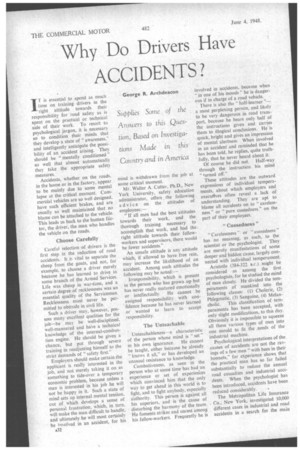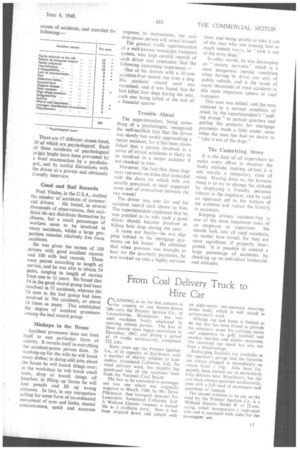Why Do Drivers Have ACCIDENTS? ?
Page 34

Page 37

If you've noticed an error in this article please click here to report it so we can fix it.
George R. Archdeacon
IT is essential to spend as much time on training drivers in the right attitude towards their responsibility for road safety as is spent on the practical or technical side of their work. To resort to psychological jargon, it is necessary so to condition their minds that they develop a state of "awareness." and intelligently anticipate the possibility of an accident arising. They should be "mentally conditioned" so well that almost automatically they take the appropriate safety measures.
Accidents, whether on the roads, in the home or in the factory, appear to be mainly due to some mental lapse at the critical moment. Commercial vehicles are so well designed. have such efficient brakes, and are usually so well maintained that no blame can be attached to the vehicle. This leads us back to the human fietor, the driver, the man who handles the vehicle on the roads.
Choose Carefully Careful selection of drivers is the first step. in the reduction of road accidents. It is vital to separate the sheep from the goats, and not, for example, to choose a driver merely because he has learned to drive in some branch of the Armed Services. Life was cheap in war-time, and a certain degree of recklessness was an essential quality of the Serviceman. Recklessness must never be permitted to obtrude in civil life.
Such a driver may, however, possess many excellent qualities for the job—he may be well-disciplined. well-mannered and have a technical knowledge of the internal-combustion engine. He should be given a chance, but put through severe training in readjusting himself to the strict demands of "safety first."
Employers should make certain the applicant is really interested in the job, and not merely taking it on as something to tide-over a temporary economic problem, because unless a man is interested in his job he will not be happy in it. Such a state of mind sets up internal mental tenSion, out of which develops a sense of personal frustration, which, in turn, will make the man difficult to handle. and ultimately he will most certainly be involved in an accident, for his *32 mind is withdrawn from the job at some critical moment.
Mr. Walter A. Cutter, Ph.D., New York University, safety education administrator, offers . the following advice on the attitudes of employees:—
" If all men had the best attitudes towards their work, and the thorough training necessary to accomplish that work, and had the. right attitude towards their fellowworkers and supervisors, there would be fewer accidents."
An unsafe attitude is any attitude which, if allowed to have free rein, may increase the likelihood of an accident. Among such attitudes the following may be noted:—
Irresponsibility, which is present in the person Who has grown up but has never really matured emotionally or intellectually. He cannot be assigned responsibility with confidence because he has never learned or wanted to learn to accept • responsibility.
The Unteachable Unteachableness—a characteristic of the person whose mind is " set " in his own ignorance. He cannot be taught, either because he already "knows it all," or has developed an unusual resistance to knowledge.
Combativeness, as seen in the person who at some time has had an experience or set of experiences which convinced him that the only way to get ahead in this world is to fight, and to fight anybody, especially authority. This person is against all his superiors, and is the cause of disturbing the harmony of the team. He foments strikes and unrest among his fellow-workers. Frequently he is involved in accidents, because when in one of his moods" he is dangerous if in charge of a road vehicle.
There is also the "half-learner "a most perplexing person, and likely to be very dangerous in road transport, because he hears only half of the instructions given and carries them to illogical conclusions. He is quick, bright and gives an impression of mental alertness. When involved in an accident and reminded that he has been told, he replies, quite truthfully, that he never heard about it.
Of course he did not. Half-way through the instruction his mind "turned off.
These attitudes are the outward expressions of individual temperaments, about which employers and executives often reveal a lack of understanding. They are apt to blame all accidents on to " carelessness " or "pure cussedness." on the part of their employees.
" Cussedness "
" Carelessness " or "cussedness " has no meaning, as such, to the scientist or the psychologist. They are merely manifestations of some deeper and hidden cause, largely connected with individual temperament.
Aristotle (384-322 B.c.) might be considered as among the first psychologists, for he studied the mind of man closely. He divided the temperaments of mankind into the following classes: (1) Choleric, (2) Phlegmatic, (3) Sanguine, (4) Melan
cholic. This classification of temperaments has been accepted, with only slight modifications, to this day. Obviously it is impossible to squeeze all these various types of men into one mould to fit the needs of the industrial machine.
Psychological interpretations of the causes of accidents are not the ravings of a few men " with bees in their bonnets," for experience shows that the practical man has so far failed substantially to reduce the annual road casualties and industrial accidents. When the psychologist has been introduced, accidents have been reduced considerably.
The Metropolitan Life Insurance • Co., New York, investigated 10,000 different cases in industrial and road accidents in a search for the main causes of accidents, and recorded the following:— There are 17 different causes listed, 10 of which are psychological. Each of these accidents of psychological origin 'Might have been prevented by a brief examination by a psychologist, and by tactful discussions with the driver at a private and obviously friendly interview.
Good and Bad Records Prof. Viteles, in the U.S.A., studied the number of accidents of commer
cial drivers. He found, in several thousands of observations, that accidents do not distribute themselves by chance, but a small percentage of workers seem to be involved in many accidents, whilst a large proportion remains relatively free from accidents.
He was given the names of 100 drivers with good accident records and 100 with bad records. These were paired according to length of service, and he was able to obtain 54 pairs, ranging in length of service from one to 11 years. He found that 54 in the good record group had been involved in 57 accidents, whereas the 54 men in the bad group had been involved in 784 accidents, or about 14 times as many. This established the degree of accident proneness among the bad record group.
Mishaps in the Horne Accident proneness does not limit itself to one particular form of activity. It reveals itself in everything the accident-prone person does. In washing-up for the wife he will break many dishes; in doing odd jobs about the house he will knock things over; in the workshop he will break small tools, drop or knock things off benches; in filling up forms he will lose pencils and fill up wrong columns. In fact, in any occupation calling for some form of co-ordinated movement of eyes and limbs, mental concentration, quick and accurate
response to instructions, the accident-prone person will reveal himself.
The general traffic superintendent of a well-known municipal transport system, who kept careful records of each driver and conductor, had the following interesting experience:— One of his drivers with a 10-year accident-free record ran over a dog His accident record card was examined, and it was found that he had killed four dogs during the year, each one being killed at the end of a financial quarter.
Trouble Ahead The superintendent, being something of a psychologist, recognized the well-testified fact that the driver was slowly but surely approaching a major accident, for it has been established that a person involved in a series of trivial accidents is likely to be involved in a major accident if not checked in time.
Moreover, the fact that these dogs were run-over on dates that coincided with the dates on which bills are usually presented, at least suggested some sort of connection between the two events!
The driver was sent for and his accident record card shown to him. The superintendent explained that he was puzzled as to why such a good driver should become involved in killing four dogs during the year.
It came out finally—he was slipping behind in his mortgage payments on his house. He admitted that when pressure was brought to bear for the quarterly payments, he was worked up into a highly nervous state, and being unable to take it out of the man who was causing him so much mental worry, he " took it out of the stray dogs."
In other words, he was developing an " anxiety neurosis," which is a most dangerous mental condition when having to drive any sort of public vehicle, and is the cause of many thousands of road accidents in this most important sphere of road transport.
This case was settled, and the man restored to a normal condition of mind, by the -superintendent's "pulling strings" in certain quarters and getting the pressure for mortgage payments made a little easier, since when the man has had no desire to "take it out of the dogs."
The Underlying Story It is the duty of all supervisors to make every effort to discover the faulty attitude, making certain it is not merely a temporary state of mind. Having done so, the humane thing is to try to change the attitude by displaying a friendly, personal interest in the employee, and by such an approach get to the bottom of the problem and reduce the liability to accidents.
Keeping drivers accident-free is one of the most important tasks of an employer or supervisor. He should look into all road accidents, no matter how trivial, for they are most significant if properly interpreted. It is possible to control a large percentage of accidents by checking up on individual tendencies and attitudes.
















































































